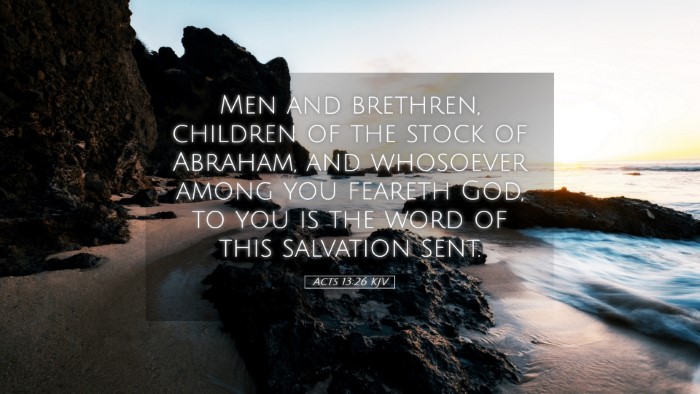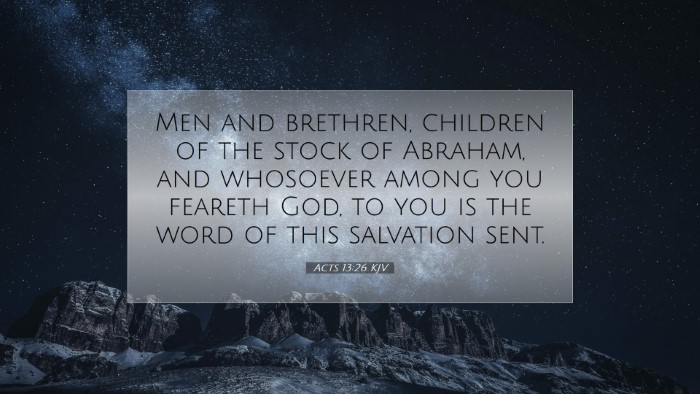Commentary on Acts 13:26
Text of Acts 13:26: "Men and brethren, children of the stock of Abraham, and whosoever among you feareth God, to you is the word of this salvation sent."
Introduction
This verse comes from the apostolic sermon delivered by Paul during his visit to the synagogue in Antioch of Pisidia. Here, Paul addresses both the Jewish listeners, identifying them as descendants of Abraham, and the Gentiles who fear God. This dual audience is significant, as it illustrates the inclusive nature of the Gospel message.
Understanding the Audience
Paul begins his address with a strong familial appeal: "Men and brethren, children of the stock of Abraham." This acknowledgment serves to establish a common heritage. As Matthew Henry notes, Paul emphasizes the covenant relationship God has with Israel, highlighting their privileged position as the chosen people. However, this privilege comes with responsibility to heed the message being proclaimed.
- Children of the Stock of Abraham: This phrase identifies the Jewish listeners, reminding them of their lineage and the promises God made to their ancestors.
- Whosoever Among You Feareth God: Here, Paul extends the invitation beyond the Jews to the Gentiles who fear God, indicating that the gospel is for all who are receptive, regardless of their ethnic background.
The Word of Salvation
The phrase "the word of this salvation" is loaded with theological significance. Albert Barnes comments that it represents the entirety of the Gospel message which Paul and the apostles were sent to proclaim. This salvation is not merely a personal experience but a broader narrative of divine intervention in human history, aiming to restore the relationship between God and humanity.
The word "salvation" (Greek: soteria) indicates both physical and spiritual deliverance. Clarke elaborates on this, explaining that it encompasses liberation from sin and its consequences while also pointing toward eternal life with God. The universality of this salvation is a vital theme throughout Acts and should resonate deeply with the Church today.
The Invitation to Acceptance
Paul's proclamation clarifies that the invitation to salvation is not exclusive. The use of "whosoever among you" mirrors the broader appeal found in John 3:16, where the Gospel's reach extends to all who believe. This is a critical point for pastors and theologians as they reconcile the doctrines of election and free will. While Israel holds a special place in the salvific plan, the accessibility of the Gospel calls for an inclusive understanding that fulfills God's desire that none should perish.
Responsibility of the Audience
With the message that "to you is the word of this salvation sent," comes the inherent expectation for the audience to respond. Matthew Henry emphasizes the importance of an active reception of God’s word, suggesting that hearing alone is insufficient; there must be a corresponding faith and obedience to the call of God.
For the pastor or student of the Bible, this underscores the need for preaching that not only presents the truth of salvation but calls for a response. Each sermon and teaching should evoke in the listener a sense of the urgency and importance of accepting the word of salvation.
Theological Implications
This verse carries significant theological implications regarding the nature of salvation:
- Inclusivity of God's Salvation: God’s salvific message transcends ethnic and cultural boundaries.
- Historical Continuity: Paul roots his message in the history of Israel, showing that the coming of Christ was the fulfillment of the promises made to Abraham and his descendants.
- Call to Faith: The verse reflects the apostolic mission of evangelism and highlights the necessity of faith in response to the Gospel.
Conclusion
In Acts 13:26, Paul masterfully addresses both Jews and Gentiles, affirming the universal invitation of the Gospel message. The concept of salvation is intricately woven into the fabric of both Jewish heritage and the broader human experience. For contemporary readers—pastors, students, and theologians alike—this serves as a powerful reminder of the responsibility to share the hope of salvation with all peoples, and to engage in the transformative work of spreading the word of God.
Ultimately, Acts 13:26 calls believers to a profound appreciation of their faith heritage while simultaneously promoting the urgency of sharing the Gospel with a world in need. It affirms that the message of salvation is a gift offered freely and calls for a response from all who hear it.


